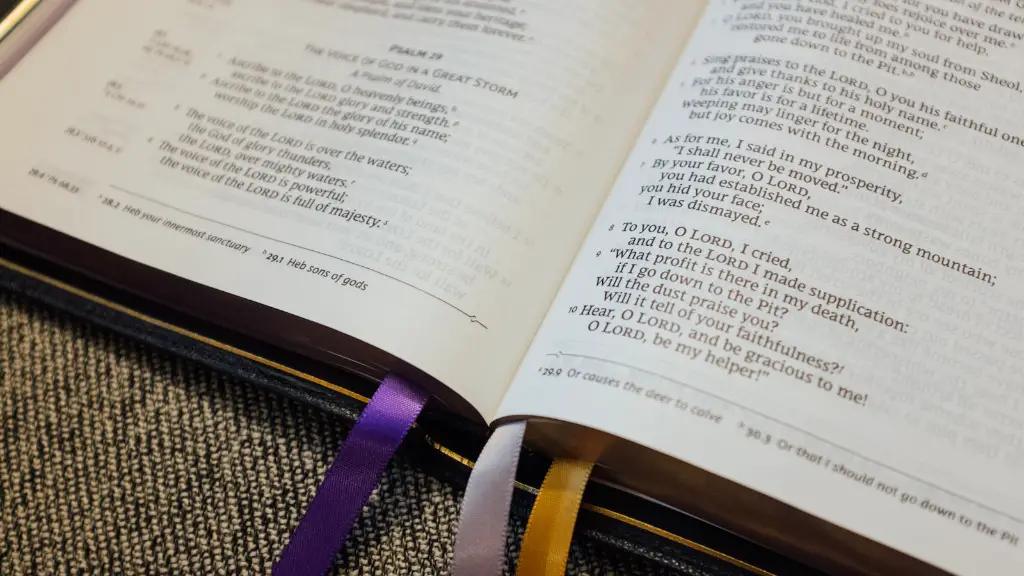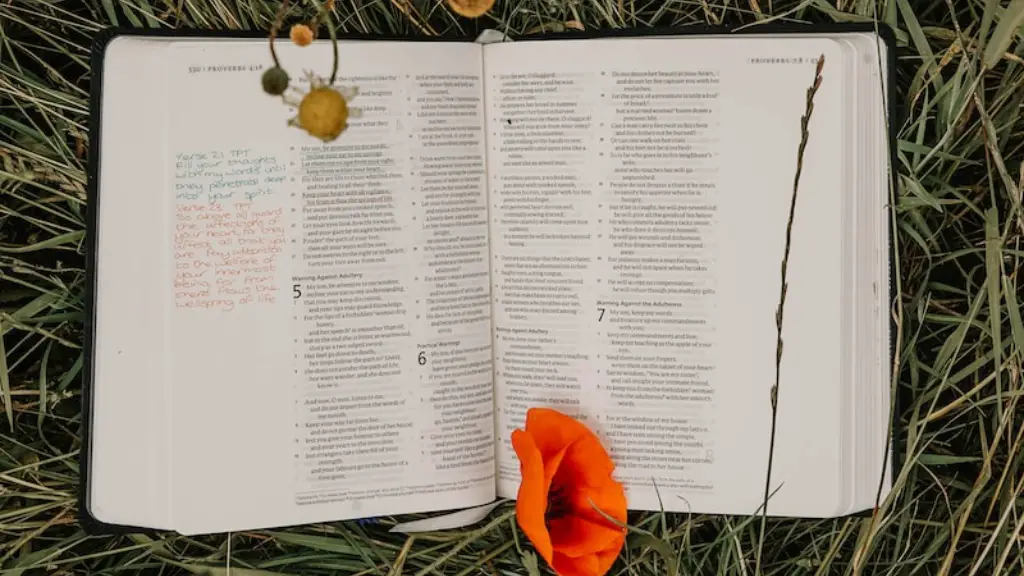What Does The Bible Say About Self Love
In the Bible, there are many references to loving oneself, from passages about self-care and loving yourself as you are, to passages about seeking your own happiness. For example, Proverbs 3:5-6 says “Trust in the Lord with all your heart and lean not on your own understanding; in all your ways acknowledge him and he will make your paths straight.” This passage is often interpreted as a cue to practice healthy self-love and make sure to turn to God and His wisdom, rather than relying on our worldly understanding. Other passages discuss building a strong character, emotional well-being, and taking time to appreciate ourselves both internally and externally.
The Bible also mentions the importance of humility when considering self-love. In Philippians 2:3 we learn that “Do nothing out of selfish ambition or vain conceit. Rather, in humility value others above yourselves.” This encourages individuals to reach out to those around them, to help the greater good of society, rather than simply satisfying personal wants and needs. It’s vital to remember that loving ourselves shouldn’t come at the expense of our relationships with others. The meaning of this verse also suggests to us that we should not be over-confident or proud, and to view ourselves as we would view others.
God continuously reminds us in His Word to be kind to ourselves and to practice self-love. Galatians 5:22-23 reads “But the Holy Spirit produces this kind of fruit in our lives: love, joy, peace, patience, kindness, goodness, faithfulness, 23 gentleness, and self-control.” This passage paints a picture of self-love as a process of self-betterment and growth. We learn that when we fill our lives with the Spirit’s love, joy, peace, and patience, we naturally become kinder, more loving to ourselves and others, and better controlled.
In 1 Corinthians 6:19-20, Paul urges us to “love your body as a temple,” reminding us to take care of ourselves and practice responsible self-care. Though it’s important to focus on our spiritual well-being, we mustn’t forget our physical bodies in the process. If we don’t take care of ourselves, we won’t be able to better ourselves and serve God’s grand purpose. It’s important to note, however, that this passage of self-love is tempered with a warning of not falling into worldly temptations.
Self-love, according to the Bible, is not arrogance or conceit. Matthew 22:39 says “Love your neighbor as yourself.” This telling passage encourages us to recognize and examine our own worth before looking to the needs of others. It’s an invitation to view ourselves with acceptance and understanding and to always remember that we too deserve love and care. In this way, we can better equip ourselves to extend kindness and love to those we encounter.
Respecting Others
In 1 Corinthians 10:24, God encourages us to live in such a way that we may “please our neighbor for his good, to build him up”. This passage underscores the importance of respecting not only ourselves but others as well. We learn to not be selfish with our love, but rather to extend it to those around us and help those in need.
Galatians 5:13 encourages us to “serve one another in love”. This serves as an invitation to expand our definition of love, beyond simply loving ourselves. In other words, this emphasizes the balance of love and service to both God and neighbor. It also calls us to embody a spirit of love and humility as we interact with others, recognizing our common bond as creations of a good and loving God.
Matthew 5:44 reminds us to “love our enemies and pray for those who persecute us”. This is a command that may seem daunting and almost impossible to accomplish. But, when we recognize this to be an expression of self-love, it takes on a new and profound meaning. It’s a call to love and forgive, even if it is difficult or difficult to understand. It reinforces the notion of being loving and tolerant to others, even those who oppose us.
John 13:34 advises us to “love one another as I have loved you”. This is an important reminder that God’s perfect love should be the goal of all of our relationships, even with ourselves. It encourages us to strive to build relationships based on love and peace and to keep our hearts and minds filled with kindness and understanding.
Forgiving Yourself
Romans 8:1 informs us that “There is now no condemnation for those who are in Christ Jesus”. This passage serves as a reminder that God is our comforter and believes that we are worthy of His grace and forgiveness. He loves us no matter how many mistakes we make, how many wrongs we do, or how little we understand who we are. Even if we don’t understand ourselves, He accepts us and loves us with an unconditional love.
1 John 4:16 says “God is love”. This is a simple, yet profound reminder that God, the source of all love, will lead us and guide us to a place of understanding and embracing who we are. In believing so deeply in our worth, He reminds us that we too can show ourselves love and grace.
In Luke 6:37, Jesus advises us to “judge not, and you will not be judged; condemn not, and you will not be condemned”. This passage serves as reminder that only God has the ability to judge and if we are judgmental with ourselves, it is only preventing us from loving and caring for ourselves with an understanding and compassionate heart.
Romans 12:2 directs us to “not conform to the pattern of this world but be transformed by the renewing of your mind”. This passage is a call to step outside of our comfort zone and allow God to bless us with the peace, joy, and love that His presence brings. It teaches us that it is okay to challenge our own perspectives and seek different understandings in order to grow.
Maintaining Gratitude
Philippians 4:8 encourages us to “fix our thoughts on what is true, and honorable, and right, and pure, and lovely, and admirable.” This is a call to thoughtfully consider the good around us in order to cultivate the understanding of self-love. It directs us to appreciate the beauty in our lives, both in ourselves and in the world around us.
In 1 Thessalonians 5:18, Paul urges us to “give thanks in all circumstances”. This serves as a reminder that while there may be difficult times, they too should be met with gratitude. We must remember that everything happens in its own due time, and that God is the ultimate source of happiness and fulfillment.
In James 1:2, we learn to “Consider it pure joy, my brothers, whenever you face trials of many kinds”. This passage is an invitation to recognize the gifts that come with pain and struggle. It is a reminder to be thankful for our trials and to learn from them as we become wiser and better equipped to serve God.
In Psalm 118:24, God reminds us “This is the day that the Lord has made; let us rejoice and be glad in it”. This is an important lesson to rejoice in the moment and recognize the joy in the everyday. It’s an invitation to appreciate the beauty in the small moments and the unique blessings that we each have in our lives.
Valuing Yourself
Psalm 139:14 reads “I praise you because I am fearfully and wonderfully made; your works are wonderful, I know that full well”. This passage is a beautiful reminder of the uniqueness of each person. It’s an affirmation that our very existence is awe-inspiring, and that in recognizing and celebrating the beauty in ourselves, we can strengthen our relationship with God.
In John 15:9, Jesus instructs us to “love one another as I have loved you”. This is a call to value and appreciate each other’s worth. It is an encouragement to recognize the Divinity in ourselves and each other, knowing that we are all creations of a loving God.
1 Peter 5:5 reads “…clothe yourselves with humility toward one another, because, “God opposes the proud but shows favor to the humble”. This verse serves as a reminder to open our hearts and minds to love and care for our fellow man. This attitude helps us to put others first, so that we can be more giving and graceful with our love.
Ephesians 4:32 says “Be kind and compassionate to one another, forgiving each other, just as in Christ God forgave you”. This serves as a reminder that God forgives us for our wrongs and celebrates our right doings, and that if we want to be loved and accepted, we must first accept and love ourselves.





